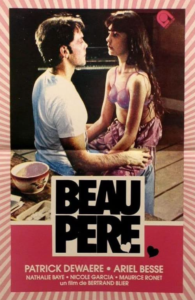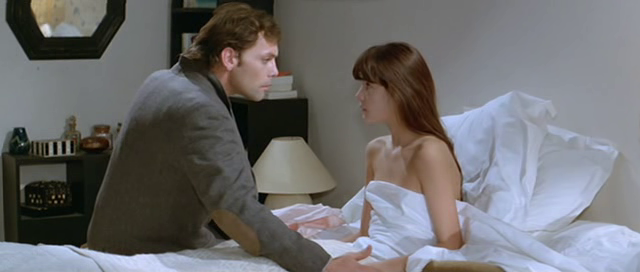Beau Pere (1981)
“We’re like two people who have come through a storm; we have to recover.”
|
Synopsis: |
|
Genres, Themes, Actors, and Directors:
Response to Peary’s Review: In his analysis, Peary argues that Beau Pere, while “not exploitative”, is nonetheless “dishonest”, given that “anytime Blier wants Dewaere and Besse to become more deeply involved, he writes words of seduction for Besse — not Dewaere — and has her deliver them in a mature manner, so we always know the affair is her idea”. In addition, Blier makes sure to show us “innocent scenes of Dewaere and Besse together before Besse’s mother was killed and [Besse] quickly evolved from daughter to wife and lover”. Whether one considers this “dishonest” or merely strategic screenwriting, it all leads to palpable sympathy on the part of audience members, who likely will find it difficult to blame Dewaere for eventually giving in to the temptations of his aggressively forthright — but understandably confused — stepdaughter. Redeeming Qualities and Moments: Must See? Links: |


One thought on “Beau Pere (1981)”
Not a must.
First viewing.
Throughout this process of checking off on the Film Fanatic lists, I’ve been introduced to a number of films by Blier – he’s a filmmaker that I hadn’t paid much attention to. I’ve been quite surprised by how much I’ve enjoyed a number of his films.
Alas, this isn’t one I enjoyed. And for a simple reason: halfway-through, the story falls apart. Blier sets up the situation rather well and, in the first half, the writing is more or less solid. (Blier includes the nice touch of having a few different characters unexpectedly speak to the audience.) However, once Dewaere (as Remi) impulsively changes his mind in order to be intimate with Besse, Blier’s script begins to meander – reaching out here and there at several possibilities for expansion, none of them fully explored, and none satisfying. Ultimately, the story just gives up altogether under its own confused and confusing weight.
That said, thanks largely to DP Sacha Vierny, the film is consistently wonderful to look at.
[The year after this film’s release, Dewaere took his life, at age 35.]